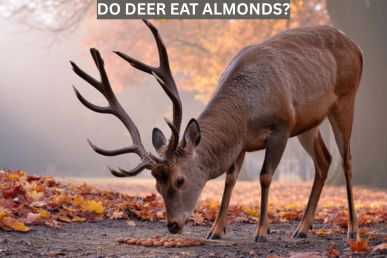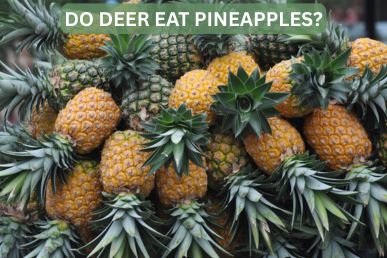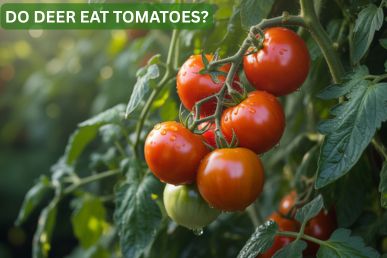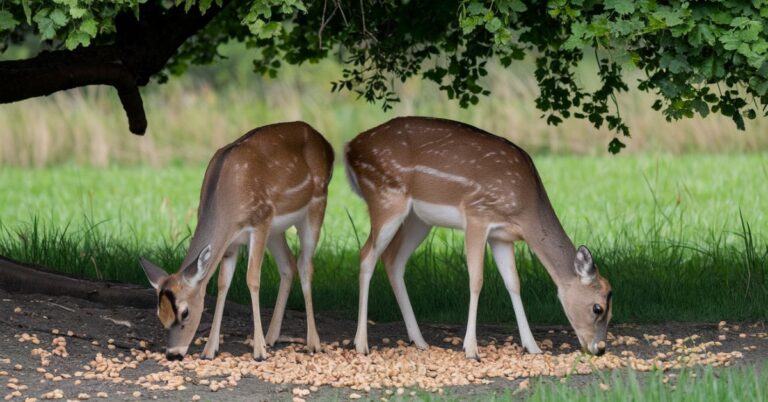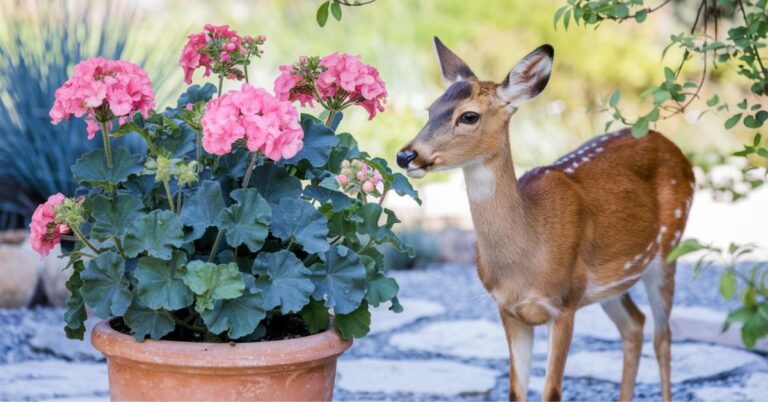Do deer eat watermelon? Including (Rinds, Fruits, Vines)
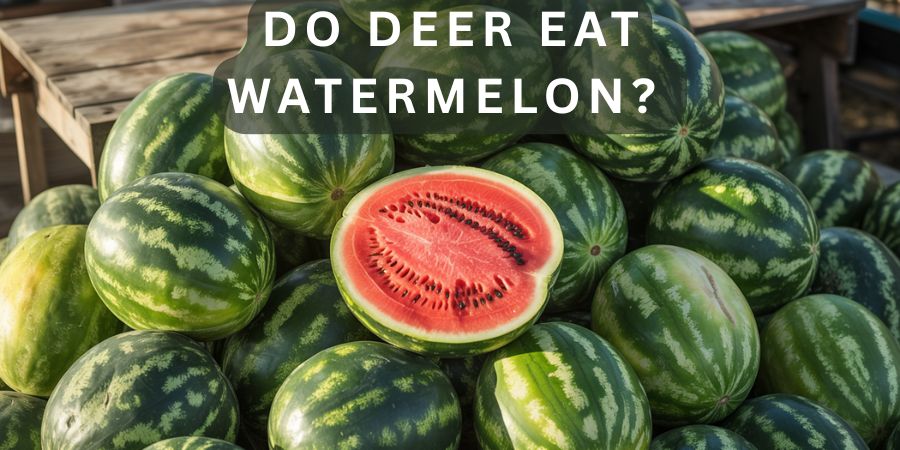
You just found your watermelon ruined! Holes torn in the green rind, sticky red juice everywhere… and hoof prints in the dirt nearby. Do deer eat watermelon? The messy evidence shouts YES!
Those gentle-looking visitors actually love chomping into sweet melons, tearing open the fruit to feast on the juicy insides.
Good news: You can protect your garden. We’ll show you how to keep deer away from your watermelons!
Do deer eat watermelon rinds?
Deer can eat the whole watermelon, but they will eat the outer green part of the watermelon, commonly called the watermelon rind, if it is cut into small pieces that they can easily chew.
Sometimes, when deer find whole watermelons in a patch, the outermost part, or outer shell, is often so large that it is a challenging task for them to eat.
The deer’s goal is to reach the soft, sweet part inside the watermelon, so if the outer shell is large, the deer may use its sharp hooves to pry it open. This behavior of deer causes significant damage to watermelon crops, which can further increase the farmers’ worries.
When a deer comes into a watermelon crop, it will try to break open one or the other watermelon and reach the soft, sweet part inside, and in trying to do so, it can damage many watermelons.
Doing so may leave some dirt in the watermelon crop, which can attract other animals and insects, and this is enough to destroy and spoil the crop.
Is Eating Watermelon Good for Deer?
Watermelon is a nutrient-dense fruit, packed with things that are essential for health, not just for humans but also for animals like deer. It offers beneficial vitamins and minerals. For example:

Think of watermelon like a cucumber – it’s a fantastic source of hydration because it’s 92% water, according to watermelon.org. This makes it a great snack, especially for deer living in hot, dry environments where finding water can be hard.
Just like they thrive by consuming a variety of foods like fruits (think apples and bananas) and vegetables (like carrots and sweet potatoes), watermelon can be a safe and beneficial occasional treat.
However, it should only be offered in moderation as part of their overall diet; too much fruit isn’t natural, so owners should adjust how much they give.
Is It Okay to Feed Watermelon to Deer?
While deer naturally enjoy the sweet, juicy taste of watermelon, you might be tempted to leave out slices or scraps just to treat your gentle woodland visitors.
But before you start offering your extra melons, it’s important to ask — should we feed watermelon to deer on purpose?
The short answer is: not usually. Here’s why:
The Risks of Feeding Deer Watermelon (or Any Human Food)
If you feed a deer anything, even something natural like watermelon, it can cause a lot of problems for them.
- Disrupts natural foraging behavior
- It can attract too many deer
- Increases the risk of accidents
- Improper diet over time
Will Deer Eat Whole Watermelon Plants?
Yes, deer definitely eat parts of watermelon plants and love the fruit! They most commonly nibble on the tender leaves and vines, especially young ones.
When the big, ripe melon appears, deer really chow down on it. They often puncture the tough outer rind to get at the sweet, juicy fruit inside.
While they don’t usually eat the entire plant (roots, thick stems, and the hard rind are often left behind), technically they feed on almost everything else – leaves, vines, flowers, and the delicious inside of the watermelons.
This munching can ruin your harvest and badly damage your patch. Sadly, a damaged watermelon left in the field can also attract unwanted pests.
Will a Watermelon Plant Recover if Eaten by Deer?
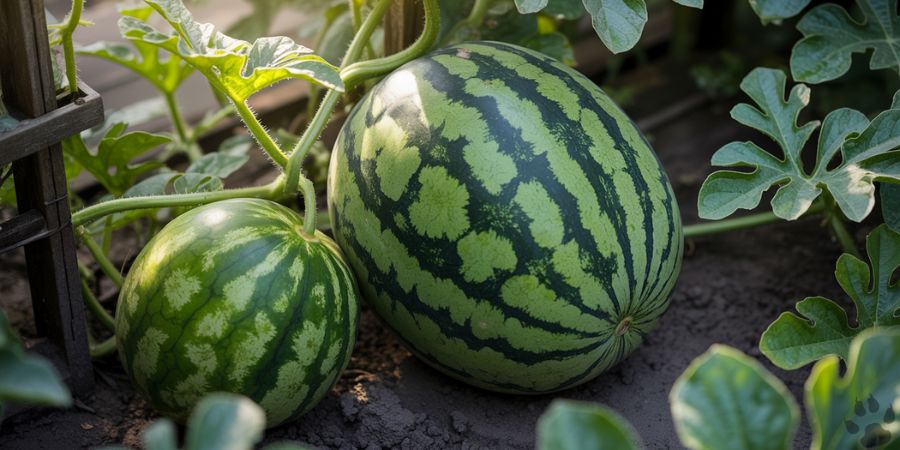
Okay, so deer find those tasty watermelon plants pretty tempting, especially the fresh, young shoots!
If a deer has consumed parts of your plant, whether it can recover really depends on its age and how much of the damage has happened. Watermelon plants are surprisingly resilient, but the stage when they get eaten matters a lot.
Early in their development, being munched on can have a really detrimental effect. It can badly hurt their growth, even stopping it completely or leaving the plant stunted. Think of a tiny seedling losing its only leaves – it struggles terribly.
However, more mature plants are tougher. They have bigger roots and more leaves stored up. If only parts are eaten, especially if the main growing tip survives, a mature plant can often withstand the damage.
It might look rough for a while, but given time, water, and sunshine, it has a much better chance to bounce back and recover its growth.
How To Protect Watermelon From Deer?
Method No. 1: Install a Fence
Keeping deer away from your precious watermelon patch is a great idea, and a sturdy fence is the key to preventing them from feasting!
Since deer are amazing jumpers, your main wall needs to be high enough – think at least 8 feet tall – to stop them from easily leaping over.
But here’s a trick I’ve found that really works well: consider putting up two parallel fences, spaced about 3 to 4 feet apart. This space between them messes with a deer’s ability to judge the distance for a safe landing when they jump, making them much less likely to even try.
You can use strong chicken wire, plastic netting, or metal mesh for these fences. Just mind that you leave enough room inside the barrier for your watermelon plants to grow big and spread out.
This setup also lets you easily adjust things or tend to individual plants. It’s smart to build it strong from the start, thinking about the future size of your vines.
Remember, deer have sharp eyes and will quickly spot your tempting melons if they can see them clearly on your land, so a good fence is your best bet!
Method No. 2: Repellents
Most people get so frustrated when they see deer in their watermelon garden that they don’t know what to do. In such a situation, you can use repellents that you can find at the grocery store or make at home.
Some repellents available in stores contain the smell of fox and coyote urine because these animals are known to be deer predators. So, when you use these repellents, the deer will think that their predator is near them, and they will move away from your garden.
Apart from this, if we talk about homemade repellents, you can make a spray by mixing hot peppers and garlic because their smell is very strong and the taste is bad. Deer will definitely run away from this spray.
But let me make one thing clear to you here that you have to use the repellents regularly and change them over time. If you use the same repellent for months, the deer will get used to it and will stop being afraid of it.
So, my advice is to use one repellent for a while and then start using another repellent. Human hair is available in every home; you can also use it because deer do not like the human scent very much.
Method No. 3: Avoid frequent fertilizers
If you want to protect your watermelon from deer, you need to minimize the use of fertilizer because it is something that makes watermelon plants grow very quickly and gives them a sweet aroma.
Especially fertilizers that are high in nitrogen make watermelon plants grow very quickly. So, using too much fertilizer doesn’t keep deer away from your garden, but rather invites them into your garden.
However, if you want to use more fertilizer despite knowing all these things, then you will have to use fences or other physical barriers.
Method No. 4: Sidetracking
Deer find many garden plants palatable, meaning super tasty, but they avoid others that are distasteful.
To repel them, include natural deterrents like yarrow, boxwood, barberry, hollies, azalea, spirea, Shasta daisies, or iris around your property.
These act as a living repellent! Here’s a smart trick:
- Create a sacrifice section in one part of your yard where you grow plants deer love. They’ll likely eat there and leave your main garden alone.
- Alongside this, grow deer-resistant plants near your perimeter. If you bear with this setup now, your future garden will fare better. Deer are more willing to stick to their snack zone!
Method No. 5: Use motion deterrents
Deer are naturally skittish creatures, which means they scare easily, especially sensitive to hearing loud noises and seeing unexpected movement. We can use this to our advantage! My favorite, most reliable option is the motion-activated sprinkler.
👉 This popular motion-activated sprinkler on Amazon does the job well and works day or night.
Here’s the trick: place these sprinklers where deer approach, like in front of your precious watermelon patch. When a deer walks by, the device will detect its motion and instantly shoot a powerful burst of water.
The sudden noise and spray leave the startled deer hightailing it out of there! It works because it surprises them by using what they fear most.
Method No. 6: Companion Planting
So, you’re growing watermelons and maybe other tasty vegetables, but deer keep visiting? Companion planting is a smart trick! This means putting certain crops near your melons that deer really dislike.
These special plants act as natural deterrents because they have strong smells or an odor deer hate, basically becoming living repellents.
Think of them as guard plants! Some great resistant choices to fend off deer include:
- Garlic and daffodils (deer avoid digging near them).
- Lavender, with its lovely scent, we enjoy, but deer don’t.
- Strong-smelling herbs like sage, rosemary, and dill.
Planting these smelly friends around your watermelon patch creates a barrier that deer often won’t cross. For extra help, especially on the edges, you could also try Fend Off Sticks.
Method No. 7: Nylon Stockings with Soap
If you’re trying to protect your garden from deer snacking on treats like watermelon, try this clever hack with Irish Spring soap! Grab a bar of this strong-scented soap, slide it into a nylon stocking, and hang it from a tree branch around your plants.
The powerful scent is really good at keeping those curious deer out of the area because they dislike the smell—simple and effective!
Grab a pack of Irish Spring bars on Amazon — it’s the soap almost every gardener uses for this hack.
Method No. 8: Plastic Owl or Scarecrow
To discourage deer from eating your watermelons, some folks try fake owls or scarecrows.
The idea is that these look like a predator (like a big bird or a scary person) to a deer. Deer are pretty mindful of danger, especially things that seem like a threat nearby.
A plastic owl might have big, shiny eyes, sometimes even red ones, meant to look scary like a cat’s eyes watching them.
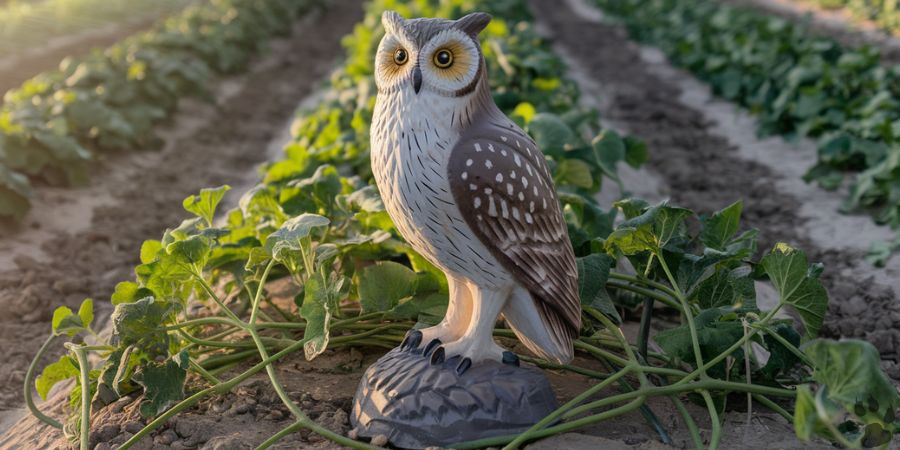
Scarecrows often have scary faces or flapping clothes. Sometimes, adding strong smells (odors) near them can help make the spot seem even more unsafe.
The hope is that these tricks will make deer nervous enough to stop coming close or at least help keep them away for a while.
What Animals Naturally Eat Watermelons?

Conclusion:
Let’s face it, deer can be a real nuisance in our gardens and farms, especially when delicious crops like watermelon are around.
While they usually target leaves and tender shoots, they won’t say no to the sweet fruit itself if they get the chance! They might even nibble the tough rind.
Although watermelon plants aren’t always their first choice, hungry deer certainly aren’t immune to their appeal and can cause significant damage or completely consume your melons. This harm isn’t the exception; it happens with many tasty foods they find.
So, how do you prevent them from accessing your patch?
Your best bet is to install a sturdy fence that’s tall enough – deer are expert jumpers, so a high fence they can’t easily jump over is essential. If a really tall fence isn’t possible, a shorter one combined with other methods might help, but it’s less foolproof.
Planting strong-smelling plants like lavender or rosemary around your watermelon patch can create a thick, smelly barrier that deer dislike.
While no single trick is guaranteed, using these preventative measures together will increase your chances and reduce the likelihood of deer reaching your fruit. This gives you a much better option for finally harvesting your own bountiful, sweet, and juicy watermelons!
Frequently Asked Questions:
Do deer eat watermelon skin?
Deer are herbivores, meaning they eat plants and fruits. Yep, they’ll consume watermelon, skin (rind) included, especially if other food sources are scarce. However, they much prefer the sweet, juicy flesh over the tough rind. So while it falls into their category of food, it’s not their favorite part.
Do deer eat watermelon vines?
Yes, deer often eat watermelon vines! They’re known to consume the young, tender leaves and stems of the plant. Especially when these plants are new, deer cause significant damage to crops. They aren’t easily deterred, so protecting your vines is key.


